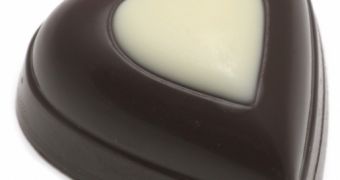Eating one small square of dark chocolate daily keeps heart-related diseases and their consequences at bay, according to an Italian study.
Almost every little thing you like to eat (or drink or inhale or feel) is generally labeled as being bad for health and officially accompanied by a warning. But many of these, as dozens of studies show (until, of course, proven otherwise), are in fact health boosters when consumed in moderate quantities. Such examples include beer, coffee, red wine, sunlight, marijuana (yes, it's true, it has been medically tested), chocolate and, well, you know what the number one bad thing that is good for health is, even if we're not allowed to say it here. But of all these, we'll only discuss the one related to the latest discovery.
So, chocolate fans, you may finally be happy and have a clinical reason to sink your teeth into, uhm, just a tiny bit of chocolate each day. But not just any type of chocolate – the sugar-packed bars or the milky kind just won't do. It's the dark, cocoa-abundant type that you're looking for. Plenty of recent studies demonstrated that its antioxidant flavonols prevent certain types of cancer, while also helping arteries not to clog. Latest research pointed out the property of chocolate to increase the brain's blood flow, safeguarding it against dementia.
This specific Italian study of the Moli-sani project (one of the biggest health research studies ever conducted in Europe), points out that 6.7 grams (0.23 ounces) per day of the dark and delicious chocolate is the perfect quantity. When you're in for a bite, compare the bite size with the total weight of the bar and try to comply to these recommendations if you want to achieve the specified results.
The C-reactive protein has been found to be a factor associated with chronic inflammation of the tissues of the circulatory system that leads to myocardial infarction (heart-attack). Tests on the blood of 4.849 healthy, risk-free subjects (without high levels of cholesterol, blood pressure or other such factors) show that dark chocolate consumption is linked to the levels of this protein. "We started from the hypothesis that high amounts of antioxidants contained in the cocoa seeds, in particular flavonoids and other kinds of polyphenols, might have beneficial effects on the inflammatory state," stated Romina di Giuseppe, the main author of the research. "Our results have been absolutely encouraging: People having moderate amounts of dark chocolate regularly have significantly lower levels of C-reactive protein in their blood. In other words, their inflammatory state is considerably reduced." Keep in mind that the scientists found that the milk in chocolate meddles with the polyphenols, which cancels its beneficial effects.
And you should also be aware of the fact that, in the light of these findings, thrift is the most important thing. As di Giuseppe adds, "The best effect is obtained by consuming an average amount of 6.7 grams of chocolate per day, corresponding to a small square of chocolate twice or three times a week. Beyond these amounts the beneficial effect tends to disappear."

 14 DAY TRIAL //
14 DAY TRIAL //